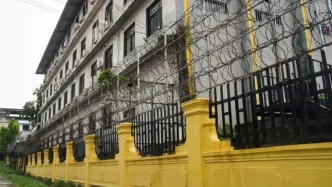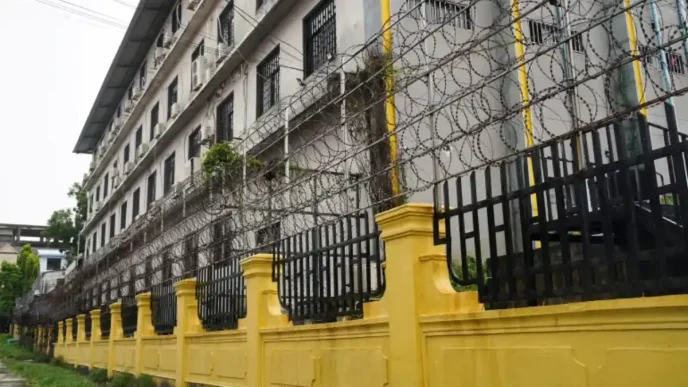A harrowing case of human trafficking has come to light in Vietnam, where four individuals have been charged with deceiving vulnerable young men into working for online fraud rings in Cambodia. The suspects, identified as Nguyễn Thanh Sáng, Lưu Trường An, Hoàng Đình Sơn, and Trần Quang Anh, allegedly recruited victims with promises of lucrative jobs, only to trap them in exploitative conditions abroad. This case, prosecuted by the Hà Nội People’s Procuracy, underscores the growing menace of cross-border crime in South East Asia, where online scams and human trafficking intersect with devastating consequences.
The lead victim in this case, 18-year-old Nguyễn Văn Q. from Bắc Giang Province, was lured with the promise of earning VNĐ25 million (approximately US$980) per month by creating fake social media profiles. Instead, he found himself ensnared in a scam operation in Phnom Penh, forced to pose as a young woman online to defraud Vietnamese men. When Q. attempted to escape, his captors allegedly demanded a ransom of VNĐ200 million ($7,800) from his family, releasing him only after receiving VNĐ176 million ($6,888) in payments. His ordeal, reported to the police by his father, led to the arrest of the four suspects.
This case is not an isolated incident but part of a broader pattern of exploitation that exploits economic desperation and lax border controls in the region. It raises urgent questions about the mechanisms driving such crimes, the complicity of foreign entities, and the challenges faced by authorities in Vietnam and Cambodia in tackling these transnational networks.
A Sophisticated Deception
According to the investigation, Sáng and An travelled to Cambodia in 2022 to work for a Chinese-owned company, where they met Sơn and Anh. There, they were allegedly trained to impersonate young women on social media platforms, befriending Vietnamese men and tricking them into sending money in exchange for commissions. The profits, authorities claim, were pocketed by the scammers, with little to no benefit for the workers involved.
In early 2023, three of the suspects—Sơn, Sáng, and An—returned to Vietnam and began recruiting others to join the operation in Cambodia. Using platforms like Facebook, they targeted young men from rural provinces, capitalising on their aspirations for better income. Nguyễn Văn Q. was one such target. An allegedly contacted him directly, painting a rosy picture of easy money through online work. Q., enticed by the offer, agreed to travel across the border, where he was given a nominal sum of $300 for expenses and put to work in a company in Phnom Penh.
Once there, the reality of his situation became clear. Q. was coerced into participating in online scams, with no way out. When he refused to continue and demanded to return home, the company allegedly imposed an exorbitant ransom. During a distressing call to his family, Q. was reportedly assaulted by several men to pressure his father into paying. Initially, his father transferred VNĐ45 million ($1,761), but when this fell short of the demanded amount, Q. was moved to another company and forced to continue scamming. Only after an additional payment of VNĐ131 million ($5,127) was he finally released.
The Broader Context of Cross-Border Crime
This case shines a spotlight on the alarming rise of human trafficking linked to online fraud in South East Asia. Cambodia, in particular, has emerged as a hub for such operations, often involving foreign-owned companies that exploit lax regulations and porous borders. Many of these scams target victims in neighbouring countries like Vietnam, Thailand, and Laos, preying on economic disparities and the promise of quick wealth.
Experts suggest that these operations are often run by sophisticated criminal networks, sometimes with ties to organised crime syndicates. Workers, lured under false pretences, are frequently subjected to debt bondage, physical violence, and psychological coercion. The use of ransom demands, as seen in Q.’s case, is a common tactic to ensure compliance or extract further profit from victims’ families.
Vietnam, with its young population and high demand for employment opportunities, is particularly vulnerable. Rural provinces, where access to education and jobs is limited, provide fertile ground for recruiters. The promise of high earnings abroad, even if vaguely described, is often enough to convince individuals to take the risk. Once across the border, however, they find themselves trapped, with little recourse to local authorities in Cambodia, where corruption and limited resources can hinder rescue efforts.
Challenges for Law Enforcement
The arrests of Sáng, An, Sơn, and Anh mark a significant step forward for Vietnamese authorities, but the challenges of tackling such crimes remain daunting. Human trafficking cases often involve multiple jurisdictions, requiring close cooperation between Vietnam and Cambodia. While bilateral agreements exist to combat cross-border crime, implementation is inconsistent, hampered by differing legal frameworks and enforcement capacities.
Moreover, the role of foreign entities—such as the Chinese-owned company mentioned in this case—complicates matters further. Vietnamese authorities have limited jurisdiction over operations based in Cambodia, and pursuing accountability for foreign nationals involved in such schemes is often a diplomatic minefield. There are also concerns about the safety of victims who return home, as they may face stigma or retaliation from traffickers.
If confirmed, reports of widespread involvement of foreign companies in these scams could strain regional relations. Vietnam and Cambodia have historically maintained cordial ties, but issues like human trafficking and illegal border activities have occasionally tested this relationship. Analysts suggest that without stronger regulatory oversight and international cooperation, such crimes will continue to proliferate, exploiting the region’s economic and social vulnerabilities.
The Human Cost
Beyond the legal and diplomatic dimensions, the human toll of these trafficking rings is profound. Nguyễn Văn Q.’s story is a stark reminder of the personal devastation caused by such schemes. Having endured months of coercion and violence, Q. now faces the challenge of rebuilding his life, likely grappling with trauma and financial burdens incurred by his family to secure his release.
His case also highlights the ripple effects on families, who often go into debt to pay ransoms or lose trust in opportunities abroad. For many in rural Vietnam, migration—whether legal or illegal—has long been seen as a pathway to a better life. Stories like Q.’s, however, cast a shadow over such aspirations, underscoring the need for greater awareness and protective measures.
Towards Solutions
Addressing the root causes of human trafficking in the region requires a multi-pronged approach. First, governments must enhance public education campaigns to warn vulnerable populations about the dangers of deceptive job offers, particularly those involving overseas work. Community-based initiatives, supported by local leaders and NGOs, could play a vital role in disseminating accurate information and providing support to at-risk individuals.
Second, Vietnam and Cambodia must strengthen their joint efforts to dismantle trafficking networks. This includes improving border security, sharing intelligence, and ensuring that victims are repatriated safely without fear of prosecution. Legal reforms may also be necessary to close loopholes exploited by traffickers, such as the lack of stringent penalties for online fraud linked to trafficking.
Third, there is a pressing need to address the economic disparities that drive individuals into the hands of traffickers. Investment in rural development, job creation, and vocational training could offer viable alternatives to risky migration. International donors and organisations could support such initiatives, ensuring that young people like Q. have opportunities closer to home.
Finally, the role of technology platforms must not be overlooked. Social media sites like Facebook, used by recruiters in this case, have a responsibility to monitor and remove content linked to trafficking and scams. While some progress has been made in this area, greater collaboration with law enforcement is essential to identify and disrupt criminal activities online.
A Call for Vigilance
The charges against Nguyễn Thanh Sáng, Lưu Trường An, Hoàng Đình Sơn, and Trần Quang Anh are a crucial step towards justice for Nguyễn Văn Q. and countless others who have fallen victim to similar schemes. Yet, this case is merely the tip of the iceberg in a region grappling with the intersection of human trafficking and cybercrime.
As South East Asia continues to navigate rapid economic and technological change, the vulnerabilities exposed by this case must serve as a wake-up call. Governments, communities, and international partners must work together to protect the region’s most vulnerable, ensuring that the promise of a better life does not become a trap for exploitation. For now, the focus remains on bringing perpetrators to account and supporting survivors—a task that demands both urgency and resolve.














